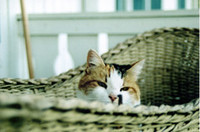Recent study indicates that changes in a healthy cat's routine can spur 'sickness behaviors'

flickr photo courtesy of flowbadger
Cat owners the world over are nodding their heads in agreement with a recently published study in the Journal of the American Veterinary Medical Association.
Researchers wanted to find out if cats who are healthy, but experiencing emotional upset would indeed exhibit "sickness behaviors" similar to their chronically ill counterparts who suffer from a chronic illness like Interstitial Cystitis.
Interstitial Cystitis is characterized by recurring discomfort or pain in the bladder and often both an urgent and frequent need to urinate.
As it turns out, healthy cats can exhibit "symptoms" (referred to by researchers as "sickness behaviors") like vomiting, refusing to eat and eliminating outside of their litter box when faced with something as seemingly benign as a routine change.
Other variables that are found to affect cats negatively are lack of interaction and changes in caretakers.
That's certainly cause for cat owners to pay close attention to environmental changes that occur and dialogue with veterinary staff clearly when a feline comes into be seen and exhibiting those sort of symptoms.
"For veterinary clinicians, when you have a cat that's not eating, is not using the litter box or has stuff coming up out of its mouth, the quality of the environment is another cause that needs to be addressed in coming up with a diagnosis," said Tony Buffington, professor of veterinary clinical sciences at Ohio State University and senior author of the study.
An additional finding in the study, published on Jan. 1, indicates that as a feline ages, the incidence of sickness behaviors increase as well when their routine is upset.
Read the study here.
The bottom line, as any experienced cat lover will say: Don't upset the apple cart.
Lorrie Shaw is a regular contributor to AnnArbor.com's pet section and wrote "Feline foraging toys - easy, fun and effective!". Reach her via email and follow her pet adventures as owner of Professional Pet Sitting on Twitter.


Comments
Lorrie Shaw
Wed, Jan 5, 2011 : 7:49 p.m.
So true, Sarah. It's funny, in talking about this topic with others, I note that folks are commenting that cats "act sick" when they experience the emotional upset. I'm not so sure that cats (most, anyway) 'act' sick. I think the vomiting, unwillingness to eat are direct, involuntary responses, to external circumstances. Many of my feline clients over the years have exhibited behavior like this: when their people ae not there, it's stressful for them. It's compounded when I'm installed as a new caregiver. Careful attention, a calm, quiet demeanor is helpful for new caregivers, as is being nurturing in a way that's not "intrusive". And yes, you're right. Putting human interpretations on feline behavior is of little value. All pets, because they cannot speak our language will manifest their inability to deal with a stressful situation (most often that we humans impose), physical maladies and the like by way of "behavior". It's up to humans to pay attention and learn to speak their language.
Sarah Rigg
Wed, Jan 5, 2011 : 10:17 a.m.
Lorrie, thanks for sharing this. A lot of the pets coverage here is dog-heavy, and I that's actually fine with me, because dog-lovers are a passionate lot. Still, it's nice to see some cat-centric posts as well, and this one is particularly useful. I think the other "bottom line" - beyond realizing that changing a routine can cause physical problems with cats - is that people need to stop automatically putting human interpretations on pet behavior, such as, "He's mad at me and that's why he's peeing out of the box." More pet owners need to realize that there is often a physical issue that causes or exacerbates what we see as "behavioral" problems in pets.